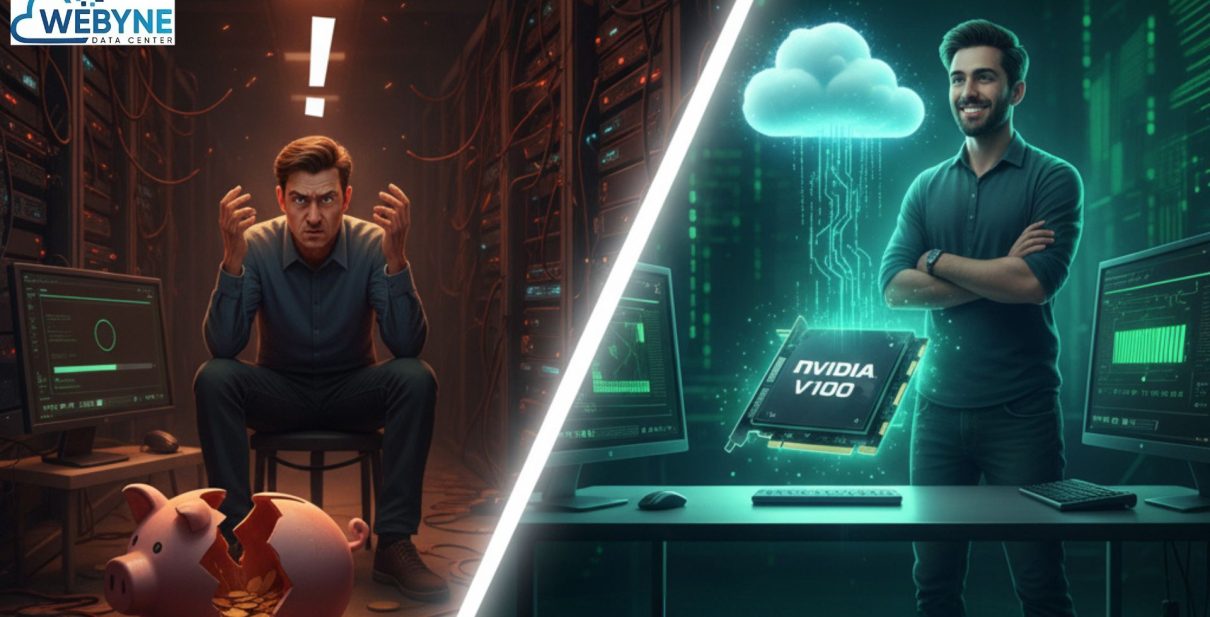Aiming to democratize access to high-end GPU compute, the new offering undercuts mainstream clouds and marketplaces.
An Indian cloud provider named Webyne has announced a bold push to make high-performance AI compute dramatically more affordable by putting NVIDIA V100 GPUs within reach of startups, researchers, and small teams. Webyne’s new V100 offering—promoted as a low-cost option for heavy AI training and inference—is being pitched at price points that industry marketplaces have recently touched, with some V100 listings as low as $0.12 per hour.
Why this matters: NVIDIA V100 is a data-center class “workhorse” GPU for machine learning and HPC workloads. Historically, major public clouds priced V100 access at several dollars per hour, making long training runs expensive for smaller teams. For example, public cloud lists place the per-GPU V100 cost in a range that is often well above $1–$2 per hour on major providers. Webyne, however, has driven some on-demand V100 rates into the low-tenths-per-hour bracket — creating a new baseline for low-cost GPU compute.
How this offer compares to the market today?
Mainstream cloud platforms (AWS, Google Cloud, Azure) typically price modern data-center GPUs at premium hourly rates — a reflection of guaranteed capacity, enterprise SLAs and integrated platform services. By contrast, Webyne have been squeezing those prices down: public price aggregators show NVIDIA V100 instances available in the $0.12–$0.21/hr band on some marketplaces, while more conservative snapshots show $0.14/hr as a commonly observed low. That gap is the commercial opportunity the Indian provider is targeting.
Who’s behind the move — and what they offer
The Webyne is behind the V100 plan (see its NVIDIA V100 product page) positions itself as a GPU-first cloud operator focused on affordability and accessibility. Its V100 plan combines a full-featured V100 GPU node with beefy CPU and RAM, NVMe storage, and a 99.95% SLA — packaged for both pay-as-you-go and monthly users. The provider says this approach helps startups and research teams skip large upfront hardware costs and run experiments that were previously out of budget.
Technical highlights in the announcement (and on the provider’s product page) include:
- A full NVIDIA V100 Tensor Core GPU for training and inference.
- Multi-core CPUs, generous RAM and NVMe storage tuned for I/O-heavy workloads.
- Pay-as-you-use billing to remove long-term commitments for smaller teams.
- Enterprise security, SLAs and 24/7 support options tailored for production workloads.
Why price alone isn’t the whole story?
Lower hourly pricing is a breakthrough for experimentation and small-scale model training, but buyers should weigh reliability, throughput and support. Large public clouds command higher rates because they provide consistent availability, managed networking and integrated tooling. Marketplaces that show V100 at sub-$0.20/hr can be attractive for bursty or non-critical workloads, but spotty availability or variable host quality can affect predictability. This new Indian company, webyne, seeks to bridge that gap by combining low-cost access with enterprise-grade hosting features.
Impact and the unique selling point
The clearest USP is affordability paired with a turnkey experience. Lower per-hour costs democratize experiments: academic labs, early-stage startups and independent AI practitioners get lower barriers to test models, tune hyperparameters and iterates quickly. That broader access could accelerate nascent AI projects and enable more diverse model development outside well-funded teams. If the sustained availability and support align with the advertised SLAs, this model could change how small teams allocate their computing budgets.
On reliability and transparency
Prospective users should validate three practical points before committing: actual region availability for V100 nodes, the billing and metering mechanism (preemptible vs dedicated), and network/egress costs, which can materially affect total price. Reputable providers publish SLA details and support channels; this announcement is accompanied by a public product page and buying options, enabling validation.
Founder or expert perspective
Webyne frames the move as part of a broader mission to “democratize access to compute” so smaller teams can build and iterate faster. Although there isn’t a direct quote from the founder in the public product brief, the message highlights the goal of making AI development cheaper and combining affordable pricing with reliable enterprise-level service. Readers who want an on-record comment can request one from the provider’s listed contacts.
The bigger picture and what’s next
Lower GPU prices are already reshaping AI economics: they shorten iteration cycles, reduce the time to prototype, and enable more experimentation. If this offering made by an Indian company- Webyne, can sustainably deliver V100 capacity at effectively market-low rates while preserving SLAs, it will pressure incumbents to offer more flexible, competitive GPU packages. Future moves may include multi-GPU scaling, managed MLOps tooling, and partnerships for dataset or model hosting — all aimed at smoothing the entire AI development lifecycle.
For teams curious to test the waters, the product page and plan details are available on the company site: www.webyne.com
Bottom line: Whether you’re a bootstrapped startup or an academic lab, cheaper access to proven NVIDIA V100 GPUs can materially lower the barrier to entry for serious model work. The recent pricing compression on marketplaces (down to low-tenths per hour in some cases) and the emergence of providers packaging GPUs with enterprise features create new choices — and new competitive pressure — across the GPU cloud market. If verified availability and SLAs hold, today’s announcement could be a meaningful step toward much more affordable, broadly accessible AI compute.




